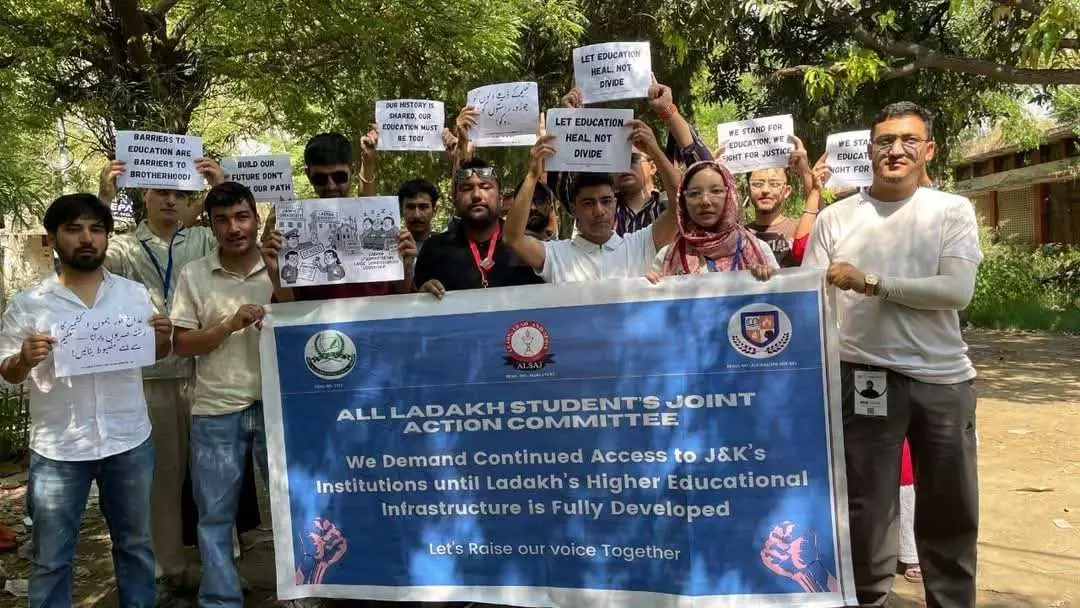
Stripped of J-K quota, no infra at home, Ladakhi students on protest path
Students from Ladakh say their preference for Jammu and Kashmir colleges is not just about proximity or legacy but about safety, affordability and quality

Six years after Ladakh was carved out as a Union Territory (UT) from Jammu and Kashmir, students from the region say the decision has left them in a state of uncertainty and exclusion. They have been denied admissions, robbed of reservations, and left without a viable roadmap for higher education, they say.
The issue came into the limelight on April 27, when Ladakhi students held a protest in Jammu against their exclusion from admissions in colleges and universities across Jammu and Kashmir following the region's bifurcation in 2019.
Students’ grievances
Mushtaq Ali, president of the Ladakh Students Welfare Association Jammu, said while the establishment of a university in Ladakh had been a long-pending demand, the haste in changing admission policies post-bifurcation has done more harm than good.
“We welcomed Ladakh University but it's still underdeveloped and lacks critical courses like nursing, engineering and other professional disciplines,” said Ali. “Despite this, Ladakhi students were stripped of the 10 per cent reservation they had in J&K institutions and must now produce a domicile certificate just like any other applicant.”
Also read: Ladakh | Regret over long-sought UT status, with no visible road ahead
Admission blues
Ali noted that before the bifurcation, students from Ladakh benefitted from leftover seats and centralised quotas under J&K’s admission policies. “That privilege has been taken away. Now, even leftover seats in nursing and other courses are being reserved exclusively for J&K students.
“Until Ladakh has full infrastructure and professional colleges, we should be allowed to study in J&K institutions,” he added. “Education policy should not punish us for administrative changes. We were part of the same state. Our families have invested decades in the education system of J&K. Now, our children are being told they don't belong,”
Indifferent authorities
Despite repeated appeals to the Ladakh administration, the Lt Governor and local political representatives, students say no concrete action has been taken. Frustrated by the silence, the students’ association is threatening a hunger strike.
“From lower-income families to aspiring professionals, everyone is suffering. Our leadership has failed to take this seriously. If our demands are not met, we’ll escalate our protests,” Ali warned.
Also read: Fewer jobs, growing frustration: Ladakh fast running out of options
One woman’s agony
Fatima (name changed), who was denied admission to a BSc Nursing course in a Jammu college, recalled the trauma and confusion following the policy shifts in 2022.
“I cleared the BOPEE entrance exam and hoped to secure a seat in a government or private nursing college. But I was told to study in Kargil instead, at a branch of a Jammu college. I didn’t want to study there, and even private college admissions were closed for us.”
After months of protests and no help from officials, Fatima eventually enrolled in a nursing programme in Himachal Pradesh with many other students from Ladakh.
Deepening crisis
“We protested not just for ourselves but for future students. When we asked why we weren’t eligible for admission anymore, we were told: ‘Ladakhi students are no longer allowed in J&K nursing colleges.’ It was heart-breaking.”
She said nursing students were the first to suffer but no one raised their voices until degree admissions were also affected. “Now the issue has escalated,” Fatima added.
Also read: Ladakh meet: 95% gazetted officers’ posts to be reserved for locals
ST reservation goes
Mehak Fatima, another student, faced similar rejection.
“I applied to Parade College in Jammu under the ST category. At first, they said my admission would go through. But later, I was refused because I didn’t have J&K domicile documents. The students' union had to intervene and I was finally admitted through leftover seats.”
However, she said the ST reservation for Ladakhi students has been effectively scrapped. “Even SKUAST (Sher-e-Kashmir University of Agricultural Sciences and Technology) has now declared Ladakhi students ineligible. Earlier, we could at least hope for leftover seats. Now, we are excluded entirely.”
Why Ladakhis prefer Jammu
Students argue that their preference for J&K colleges is not just about proximity or legacy but it’s about safety, affordability and quality.
“Many of us feel culturally secure in Jammu. We have Ladakhi hostels, communities and familiarity with the environment. The quality of education in nursing and other courses is much better in J&K,” said Fatima. “Now, economically weaker students are being forced to study in distant states, which is a huge financial burden.”
Also watch: Jigmat Paljor interview | 'Centre has ignored Ladakh continuously'
Toothless UT
Political activist Sajjad Kargili called the exclusion of Ladakhi students a result of what he termed a “visionless” UT formation.
“This is a classic example of how Ladakhis are suffering post-UT status. There are no admissions, no jobs, no safeguards. The very idea of the Union Territory has failed. We’ve been socially and institutionally boycotted.”
He said the Ladakh University lacks clarity in both scope and governance.
Powerless Hill Councils
“It doesn’t offer full subjects, has no agricultural university, and its status — whether it’s a Central, state or cluster university — is still unclear. It’s a dhokha (deception).”
Kargili believes that the root issue lies in the disenfranchisement of Ladakh’s political structures.
“The Hill Councils have no real power. Our voices are unheard. Even in recruitment, Ladakhis are left out. The UT administration must step up and communicate with J&K to restore common institutional mechanisms in the education sector too — following the pattern of Judiciary, banks and Income Tax department. Also, the Public Service Commission should be made common for both UTs,” he asserted.
